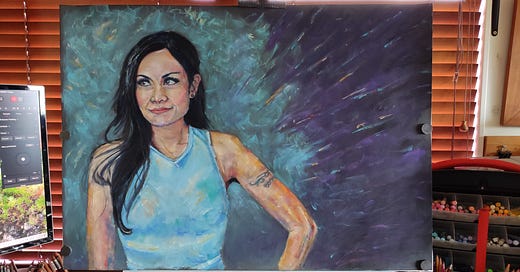Image credit David Ketchen -
- Online Art Studio - This videoMy grandmother measured everything with her fingers. There was not a measuring cup or scale in sight. Just the distance between her thumb and forefinger to gauge salt, the width of her palm for flour, and the length of her pinky for baking powder.
Standing beside her in our sunlit kitchen in our old house, I’d watch those hands, weathered by several Trinidad summers. They danced across the countertops with the certainty of someone who understood that precision wasn’t always found in perfect measurements.
"Kay," she'd say, catching me studying her movements, "this is how you know. Not with numbers. With feeling."
Then she'd grab my small hand and press it into the dough. "Feel that? That's exactly right."
I didn't understand then what I grasp now with painful clarity: life happens in the increments we can barely perceive.
The corporate boardroom couldn't be further from my grandmother's kitchen. Fluorescent lights replace sunbeams; spreadsheets substitute for recipe cards.
Yet as I sit here, too many years later, watching executives debate quarter-percent shifts in market share, I'm thinking about her hands.
Last week a client of my “boss”—a man whose entire personality seems constructed from Harvard Business Review articles and badly digested leadership books—slammed his fist on the table during our quarterly review.
"We didn't hit our targets by two percent," he fumed as if we'd committed some grievous moral failure. "Two goddamn percent."
I wanted to laugh. Not because it wasn't important (it was, at least to the shareholders), but because of how familiar it felt.
This obsession with increments. This game of inches.
When I tore my ACL playing football over 3 decades ago, the physical therapist became an unwelcome cartographer of progress. Each week, she'd measure the angle of my knee flexion, marking improvements.
"Two more degrees than last week!" she exclaimed while I stared at her blankly, my leg throbbing.
Two degrees. An increment so small I couldn't feel it—yet she assured me these microscopic improvements would eventually return me to the field and walking.
Each session felt pointless, painful markers of change too subtle to understand.
Nine months later, I played my first full game back.
I've kept the chart she made me somewhere in my suitcase filled with memories.
A graph of slow, stubborn progress, marked in single-degree improvements.
A map of patience I never knew I possessed.
We measure life in milestones but live it in millimeters.
Think about it.
My suitcase of memories – it contains every card, every letter, every inch accumulated over the last 22 years
The difference between an Olympic gold medal and no medal at all is often a hundredth of a second.
A business succeeds or fails by razor-thin margins.
Relationships strengthen or fracture over accumulated moments so minuscule we rarely register them until they've compounded into something unmistakable.
My uncle—ever the engineer—used to tell me, "Pay attention to tolerances."
He wasn't just talking about the machinery he designed. It was his life philosophy, though I only understood its application years later.
"Most failures," he'd explain while helping me with homework, "happen not because something is catastrophically wrong but because something is slightly off, and that slight error compounds."
I watch for these compounding errors now.
The small choice to skip the gym becomes a pattern. The minor work deadline missed creates a cascade. The tiny linguistic changes in how we speak to loved ones signal deeper changes.
This vigilance can be exhausting sometimes. Living at the level of inches means you can't ignore the granular. You become attuned to changes others might dismiss.
The first time I visited the Grand Canyon, I stared into that massive gash in the earth and thought about how it formed—water cutting through rock one persistent drop at a time. Power is accumulated through persistence rather than force.
We miss this when we focus only on gigantic transformations: most meaningful change doesn't arrive in revolutionary bursts but in evolutionary nudges.
I saw this with my father after my mom died. His grief wasn't a dramatic collapse but a slow adaptation. Each day, he adjusted by micrometers—five minutes longer before tears came in the morning, one additional task completed, a fraction more engagement with the world.
Progress so subtle it disappeared if you watched too closely, yet undeniable when measured across months.
He survived breath by breath.
I've come to believe we're all engaged in countless parallel games of inches.
The creatives among us understand that mastery comes through incremental skill-building rather than innate genius.
Writers produce pages one sentence at a time.
Musicians improve through repetitions so numerous they become unconscious.
I saw this incremental magic recently when my friend David
painted my portrait on his YouTube channel.Working from a still photo, he broadcast every brushstroke to his viewers. What mesmerized me wasn't just his talent but his patience—how he built my likeness dot by dot, line by line, inch by inch.
Last week, after a fustercluck of meetings about targets and layoffs, I escaped to a coffee shop. The barista—a woman probably my grandmother's age when I stood in that kitchen—noticed my exhaustion.
"Rough day?" she asked, tamping down espresso with practiced precision.
I nodded, too tired for details.
"Well," she said, sliding the finished cup toward me, "tomorrow will be a little different."
Not better. Not worse. Just different.
A tiny change in perspective that made me feel better.
I think about that interaction now, sitting at my desk, watching the squirrels bark up the tree.
The tyranny of measurement has convinced us that increments only matter when they can be quantified, graphed, and analyzed.
But my grandmother never needed measuring cups to bake bread that made you believe in God.
My father never charted her grief recovery on spreadsheets.
The most important games of inches we play are those we feel rather than calculate.
I know that if you're paying attention, life reveals itself as an accumulation of moments so slight they often escape notice.
It's the extra minute you spend listening to someone who needs to be heard.
It's the decision to try once more when exhaustion suggests surrender.
It's choosing kindness when irritation feels more justified.
It's moving forward when the progress is too small to measure but too important to abandon.
These incremental choices compound into the people we become, the lives we build, and the impact we have. They rarely make dramatic stories, but they make meaningful lives.
What else is there more than a meaningful life?
Life is a game of inches. We win not by taking big leaps but by recognizing that transformation happens in spaces too small to see but too significant to ignore.
And maybe winning isn't even the point.
Maybe the real victory is simply learning to pay attention to the inches as they pass.
Updates and happenings
Did you catch
’s article last Tuesday?Why I Love Marketing is Why I Love Community
https://substack.com/@mackcollier/p-158398245
Look out for my Guest posts this month -
on March 20th on March 25th on March 27thThank you for taking the time.
I'm a fractional COO, turning startup chaos into clarity. With 22+ years of experience across Technology, Apparel, Construction, Interior Design, Civil Engineering, and Manufacturing, I help companies scale without breaking.







Gorgeous collection of memories and reflections on current experiences to show that life happens while we're making other plans (John Lennon), unless we practice what matters in the small moments of life that accumulate. I am grateful for this perspective. (And both David's portrait of you and the photo of accumulated letters amplify your message.)
Your post reminds me of the saying, "At 211 degrees, water is hot; turn it up one degree, and it begins to boil." Also, I'm reading (well, listening) to the book "Atomic Habits," which talks about the impact small changes can make—1% better every day, or something to that effect. Life IS a matter of degrees. And perspectives. And choices.